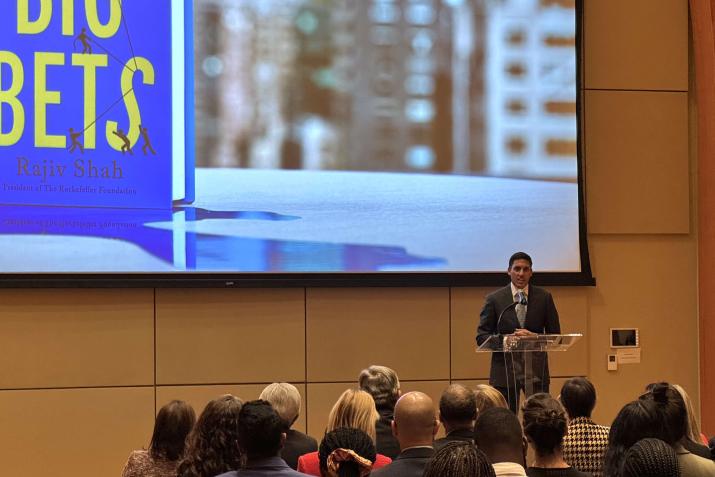
Rajiv Shah, M.D., delivers the 2024 Victor J. Dzau Distinguished Lecture in Global Health at Duke's Karsh Alumni & Visitors Center on Jan. 31. Photo by Evan Stulberger/The Rockefeller Foundation
Published February 1, 2024, last updated on February 4, 2024 under Around DGHI
Just a few days after Rajiv Shah, M.D., began leading the U.S. Agency for International Development (USAID) in 2010, an earthquake erupted in Haiti, killing an estimated 250,000 people and displacing more than a million of the island country’s citizens. One thing Shah most remembers from those chaotic days, as the international community scrambled to deploy food, clean water and medical assistance, were phone calls with Duke alumnus Paul Farmer, M.D.
‘Paul kept calling and saying if you spend all your money on immediate humanitarian relief, we’ll miss an opportunity to build something that demonstrates what health equity is all about,” Shah said during the Victor J. Dzau Distinguished Lecture in Global Health on Jan. 31.
Farmer, the co-founder of Partners in Health, was pushing not just to help Haiti recover, but to make it stronger than before the earthquake. With resources from USAID and other partners, his organization led the construction of a state-of-the-art hospital in Haiti’s capital, Port-au-Prince.
Farmer’s boldness to think beyond Haiti’s immediate circumstances left an impression on Shah, who is now the president of The Rockefeller Foundation. “It’s easy to be overwhelmed by the challenges we face. But if we can remember that even in the midst of destruction and tragedy, you can do things that represent equity and kindness and courage,” Shah told an audience of more than 200 in Duke’s Karsh Alumni & Visitors Center.
It was a message Shah threaded throughout the one-hour talk, hosted by the Duke Global Health Institute. Through stories from his career in government and private philanthropy – which has put him on the frontlines of the global effort to vaccinate children and responses to the Ebola and COVID-19 outbreaks – he illustrated how optimism and bold action have been instrumental in addressing some of the world’s biggest public health threats.
Shah drew on lessons from his new book, Big Bets: How Large-Scale Change Really Happens, which he described as a playbook for taking on complex global challenges.
“When we think of a charitable endeavor, we may think that doing a little bit of good is good enough,” Shah said. “In contrast to that, a big bet is taking a big, tough social problemand doing the hard work to say what will it take to solve that problem as comprehensively as possible.”
Big bets have three core ingredients, Shah noted. The first is a fresh approach to a large-scale problem. The second is cooperation with unlikely partners. The third is a commitment to rigorous data collection and measurement.
As one example where all those forces aligned, Shah described The Rockefeller Foundation’s push to scale up diagnostic testing in the early days of the COVID-19 pandemic, a strategy that was shaped in part by Duke health policy experts Mark McClellan, M.D., Ph.D., and Jonathan Quick, M.D.
When that effort began in April 2020, about 300,000 COVID tests were being performed each week in the U.S., and results took several days, allowing the virus to run rampant and forcing lockdowns. By bringing in partners to invest in faster antigen-based testing, the foundation helped spur a revolution in rapid testing, and by late summer 2020, the U.S. was completing 30 million tests a week.
“We felt that at 30 million tests per week, there would be enough diagnostic capability that we could avoid lockdowns, reopen the schools and be back to functioning safely in society,” Shah said.
Acceptance of rapid testing also got a boost from an unlikely partner: the National Basketball Association. By deploying rapid testing in its COVID bubble, the NBA “really did help change the public consciousness” about how to safely resume activities, Shah said. He credited NBA commissioner Adam Silver, vice chair of the Duke Board of Trustees and a member of the Rockefeller board, for understanding the power of the league’s example in embracing the science.
“I think that’s a challenge to all of us as we go forward, because people’s understanding of information is so mixed these days that we have to rely not just on health partners, but cultural institutions that define the way people think,” Shah said.
Shah closed his talk by speaking directly to students in the audience, whom he noted will inherit daunting global problems like rising food insecurity and the emergence of new infectious and non-communicable diseases as a consequence of climate change.
“Stay optimistic. Stay courageous. Be Bold,” he said. “You have to be the ones that insist that we make big bets and not just do a little bit of good.”
Visit Highlights
Before delivering his lecture, Rockefeller Foundation President Rajiv Shah visited DGHI's undergraduate global health capstone course and met with Duke faculty and leadership. The images below include photos taken by Evan Stulberger of The Rockefeller Foundation and by DGHI's Alicia Banks.














